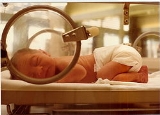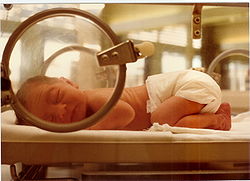
Neonatal nursing
Encyclopedia

Nursing
Nursing is a healthcare profession focused on the care of individuals, families, and communities so they may attain, maintain, or recover optimal health and quality of life from conception to death....
care for newborn infants up to 28 days after birth. The term neonatal comes from neo, "new", and natal, "pertaining to birth or origin". Neonatal nurses are a vital part of the neonatal care team.
Levels
There are three different levels of neonatal nurseryNursery (room)
A nursery is usually, in American connotations, a bedroom within a house or other dwelling set aside for an infant or toddler. A typical nursery would contain a crib , a table or platform for the purpose of changing diapers , as well as various items required for the care of the child...
where a neonatal nurse might work:
- Level I consists of caring for healthy newborns. Level I nurseries are now uncommon in the United States. Healthy babies typically share a room with their mother, and both patients are usually discharged from the hospital quickly.
- Level II provides intermediate or special care for prematurePremature birthIn humans preterm birth refers to the birth of a baby of less than 37 weeks gestational age. The cause for preterm birth is in many situations elusive and unknown; many factors appear to be associated with the development of preterm birth, making the reduction of preterm birth a challenging...
or ill newborns. At this level, infants may need special therapy provided by nursing staff, or may simply need more time before being discharged. - Level III, the Neonatal intensive-care unit (NICU), treats newborns who cannot be treated in the other levels and are in need of high technology to survive. Nurses comprise over 90 percent of the NICU staff.
Neonatal nurses may choose whether or not they wish to work in the NICU.
Qualifications and requirements
Healthcare institutions have varying entry-level requirements for neonatal nurses. Neonatal nurses are Registered NurseRegistered nurse
A registered nurse is a nurse who has graduated from a nursing program at a university or college and has passed a national licensing exam. A registered nurse helps individuals, families, and groups to achieve health and prevent disease...
s (RNs), and therefore must have an Associate of Science in Nursing
Associate of Science in Nursing
An Associate of Science in Nursing is a tertiary education nursing degree. In the United States, this type of degree is usually awarded by community colleges or similar nursing schools. Some four year colleges also offer this degree...
(ASN) or Bachelor of Science in Nursing
Bachelor of Science in Nursing
The Bachelor of Science in Nursing is an American four year academic degree in the science and principles of nursing, granted by a tertiary education university or similarly accredited school...
(BSN) degree. Some countries or institutions may also require a midwifery
Midwifery
Midwifery is a health care profession in which providers offer care to childbearing women during pregnancy, labour and birth, and during the postpartum period. They also help care for the newborn and assist the mother with breastfeeding....
qualification. Some institutions may accept newly-graduated RNs who have passed the NCLEX
NCLEX
NCLEX is an examination for the licensing of nurses in the United States. There are two types, the NCLEX-RN and the NCLEX-PN....
exam; others may require additional experience working in adult-health or medical/surgical nursing.
Some countries offer postgraduate degrees in neonatal nursing, such as the Master of Science in Nursing
Master of Science in Nursing
A Master of Science in Nursing is an advanced-level postgraduate degree for registered nurses and is considered an entry-level degree for nurse educators and managers. The degree also may prepare a nurse to seek a career as a nurse administrator, health policy expert, or clinical nurse leader...
(MSN) and various doctorates. A nurse practitioner
Nurse practitioner
A Nurse Practitioner is an Advanced practice registered nurse who has completed graduate-level education . Additional APRN roles include the Certified Registered Nurse Anesthetist s, CNMs, and CNSs...
may be required to hold a postgraduate degree. The National Association of Neonatal Nurses recommends two years' experience working in a NICU before taking graduate classes.
As with any registered nurse, local licensing or certifying bodies as well as employers may set requirements for continuing education.
There are no mandated requirements to becoming an RN in a NICU, although neonatal nurses must have certification as a Neonatal Resuscitation
Neonatal Resuscitation Program
The Neonatal Resuscitation Program was developed and is currently maintained by the American Academy of Pediatrics. This program focuses on the teaching and maintaining basic skills for the resuscitation of neonates. NRP's didactic portion includes nine lessons modules along with 5 skills...
Provider. Some units prefer new graduates who do not have experience in other units, so they may be trained in the specialty exclusively, while others prefer nurses with more experience already under their belt.
Intensive care nurses endure intensive didactic and clinical orientation, in addition to their general nursing knowledge, to provide highly specialized care for critical patients. Their competencies include the administration of high-risk medications, management of high-acuity patients requiring ventilator support, surgical care, resuscitation, advanced interventions such as extracorporeal membrane oxygenation
Extracorporeal membrane oxygenation
In intensive care medicine, extracorporeal membrane oxygenation is an extracorporeal technique of providing both cardiac and respiratory support oxygen to patients whose heart and lungs are so severely diseased or damaged that they can no longer serve their function...
or hypothermia therapy for neonatal encephalopathy
Hypothermia therapy for neonatal encephalopathy
Brain hypothermia, induced by cooling a baby to around 33°C for three days after birth, is a treatment for birth asphyxia. It has recently been proven to be the only medical intervention which reduces brain damage, and improves an infant's chance of normal survival...
procedures, as well as chronic-care management or lower acuity cares associated with premature infants such as feeding intolerance, phototherapy, or administering antibiotics. NICU RNs undergo annual skills tests and are subject to additional training to maintain contemporary practice.

